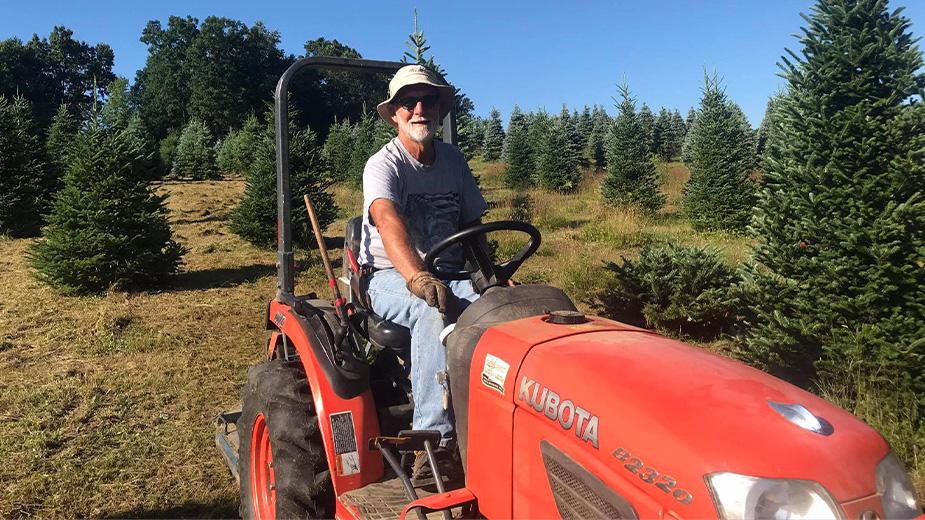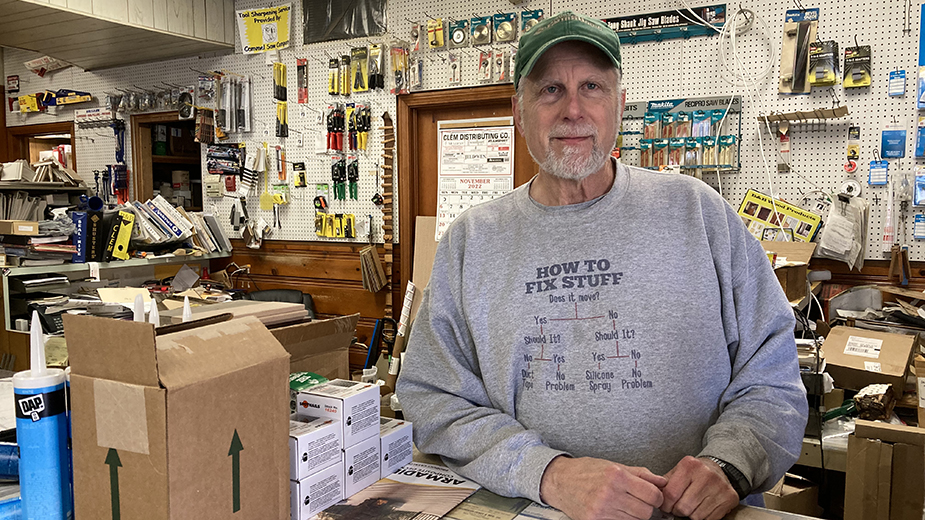Family Time Grows at Christmas Tree Farms
HUBBARD, Ohio – Mike Pieton, owner and operator of 7P Trees – Christmas Tree Farm, has been in the Christmas tree growing business since he was 9 years old.
“My parents started doing this in 1979 and I’m now running the business,” he says. The 7P name reflects the seven-member Pieton family – of which Mike is the youngest.
Pieton’s business is just one branch of the area’s Christmas tree industry.
Others include Storeyland tree farm in Burghill, Bradley Tree Farm in Vienna and Pioneer Trails Tree Farm in Poland. The Business Journal talked with the owners of each to get the measure of the seasonal industry.
Many changes
Pieton has seen many changes at the family farm over the years. But one of the biggest was the sales boost caused by the pandemic. It was felt in the entire tree industry, he says.
“March of 2020 – that fall when things started to ease up a little bit – people came out like never before,” he says. “I had so many people who just wanted to be outside with their family. You could social distance, you could walk around the tree farm [and] buy a tree.”
Pieton says he has many trees that are growing, but it takes years for them to get to proper harvesting height. The average growth for Christmas trees is around a foot a year.
Last year, Pieton planted 15,000 trees.
“A lot more people came out the last few years and bought 6-, 7-, 8-foot trees,” he says. “I don’t have a whole lot this year. So I had to bring a lot more pre-cuts to keep up with the demand.”
Pieton prides himself on sourcing his pre-cut trees locally. They were cut Nov. 21 and 22 in Ohio, he says.
“Your box stores get them from Oregon or Washington – they’re [cut] about November 1 and are sent this way,” says Pieton. “Mine are fresh pre-cuts.”
Pieton’s store has been selling a lot more wreaths, fresh garland and pine roping.
“We don’t discriminate against artificial tree people,” he says. “We like artificial tree people ironically enough because they are a lot of the ones who buy our wreaths and pine roping to get all of the pine scent in the house without all of the mess or burden of a live tree.”
Despite the effort involved in putting up a live tree, and the daily maintenance it requires, there are benefits. “The best benefit to having a real tree is just the overwhelming aroma of pine in your house,” he says.
Pieton says one thing many people also don’t realize about live trees is that they are less likely to cause a house fire than an artificial tree. “A real tree is more fire retardant than an artificial tree,” he says. “A lot of people don’t know that.”
Pieton says demand is up for trees while supply is down, but he didn’t have to raise his prices. Neither he nor his competitors try to undercut each other.
“We all play nice together and try to keep things consistent,” he says. “It’s friendly – friendly rivalries. If [a customer] can’t find a tree on our farm, we send them eight miles to the north of us to Bradley Tree Farms, and if they can’t find a tree at his place, eight miles to the north of him is Storeyland. It’s kind of like a little triangle we got going here.”
Storeyland
Debbie Yeager, co-owner of Storeyland Christmas Tree Farm, runs the Burghill farm with her husband, Carl. She says the relationship between the local tree farmers is “like family.”
“We all went on trips together – some of us went to Australia and New Zealand back in 2006,” she says. “My best friends are my tree farmer friends.”
Yeager says the farm has been open since 1956. Her husband began working there when he was 12 years old and 64 years later, it’s still within the family.
“We bought it in 1990,” Debbie says. “He had worked here, and I had helped out in some clerical type things.”
Storeyland will plant 3,000- to 3,500 trees this year on its 130-acre farm, Yeager says.
Around 2,000 trees are available on the lot this month.
This year, Storeyland brought in 300 fresh-cut Fraser fir trees from a farm in South Carolina. Fraser firs are known for short soft needles and good needle retention for holding heavy ornaments.
Debbie says many people don’t realize how much work goes into a running a tree farm. “When people call about the price of a tree, they have no idea what goes into it,” she says.
Although sales depend on many factors, Storeyland often sells 500 trees a weekend, she says.
Yeager says one major benefit of a real tree is its reduced environmental impact.
“It’s better to get a live tree,” she says. “It is not made with petroleum products and does not go into a landfill. It can be chipped and go into mulch.”
Another benefit is they hire local people – mostly teenagers and college students – for the seasonal jobs. Many come back each year because they enjoy it.
“It’s a fun business,” Yearger says. “People are usually happy.”
Bradley Tree Farm
Daniel Bradley, owner of Bradley Tree Farm, says he has been planting trees at his Vienna tree farm since 1978.
Bradley says his family originally owned the business, which started as greenhouses for plants and vegetables.
“When all of the kids moved out, they shut down all of the greenhouses,” says Bradley. “I decided to plant trees.”
The business has seen gradual growth over the years, says Bradley. He attributes the rapid growth in recent years to COVID and a growing desire for people to get out of the house.
“The last couple of years I have been very blessed with customers,” he says, noting that demand is outstripping supply.
Bradley says he is friends with other local tree farmers and often brings in trees from their farms to supplement his stock.
“I have always sold pre-cut and cut-your-own,” he says. “The pre-cut I would typically cut from the field and bring up. But I had to bring in a few this year and last year.”
Bradley says his farm has about 10 acres in trees. Planting season is in March and April.
“Before you know it, October is here,” he says.
For the last few years, Bradley says he has planted about 15,000 trees annually.
“It takes on average 10 years to get a mature tree depending on the soil, the weather, how much fertilizer you’re using [and] species of the tree,” he says. “Over the last four years – wet springs [and] dry summers – I have lost quite a few of the seedlings I planted and then you get a lot of deer damage, as well. That has cut into my inventory.”
As the vice president of Northeast Ohio Christmas Tree Growers, Bradley helps promote the industry, which represents about 30 farms.
In addition to promoting live trees, the association ships about 100 trees around Veterans Day each year to U.S. troops for Operation Evergreen.
Pioneer Trails
Mary Jan Perdulla, co-owner of Pioneer Trails Tree Farm in Poland, says global warming may be to blame for some of the additional tree growing problems.
“Its all about what grows best in your soil,” she says. “Fraser firs are really popular but it’s native to the Carolinas and the mountains, the hilly grounds of Pennsylvania and cooler temperatures. Global warming is making it warmer here. It gets too hot and some areas are too wet.”
Perdulla says she is one of the bigger tree farmers in the area and has been selling since 1990. The farm also orders in fresh cut trees from Ohio and Pennsylvania.
“We are a second-generation farm,” she says. “My son Charles and my daughter Amy are taking over.”
Perdulla says about 20% of their annual sales are the fresh-cut. She plants approximately 5,000 trees each year.
The experience of buying a tree is part of what a tree farm sells, she says.
In addition to trees, each farm offers activities, food vendors, gift shops, visits from Santa, photographs and horse-drawn carriages.
“The horse-drawn wagon rides are one of our biggest draw tickets for the public,” she says. “They want to come out and see the horses every year.”
Pioneer Trails also has a gift shop and offers hot chocolate and donuts on the weekends.
“For a lot of people, this is a tradition every year,” she says. “They come out and ride the wagon. We give them a sled and a saw [and] they wander around.”
“We’re trying to sell an experience,” she says. “It’s not like going to Lowe’s or Home Depot and buying a pre-cut. It’s all about knowing the customers and the service we provide.”
Pictured at top: Carl Yeager, co-owner of Storeyland Christmas Tree Farm.
Copyright 2024 The Business Journal, Youngstown, Ohio.



